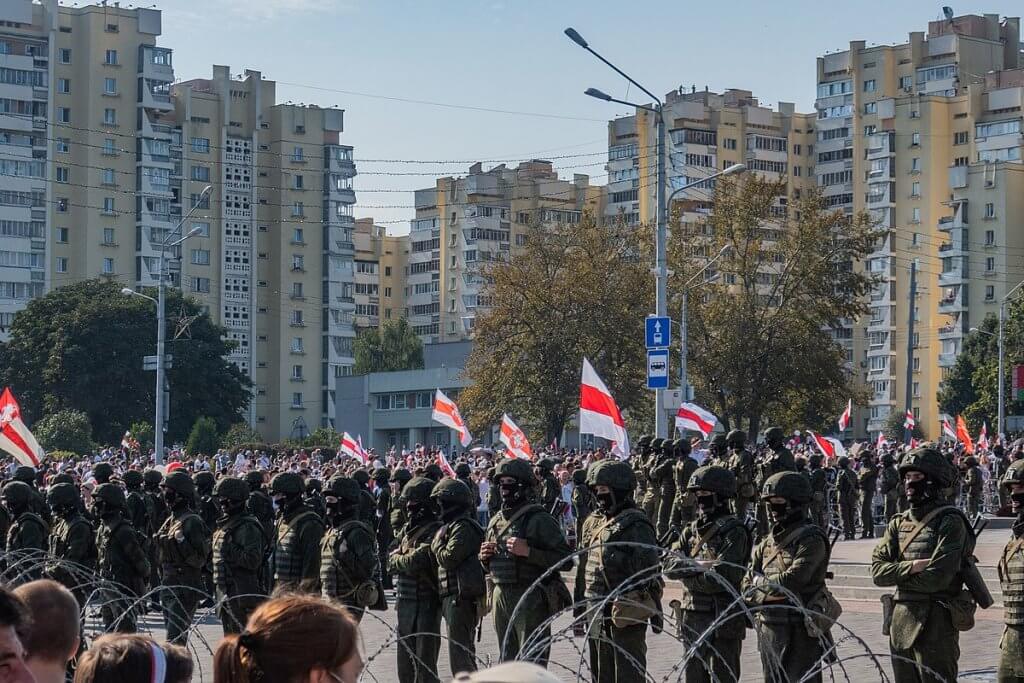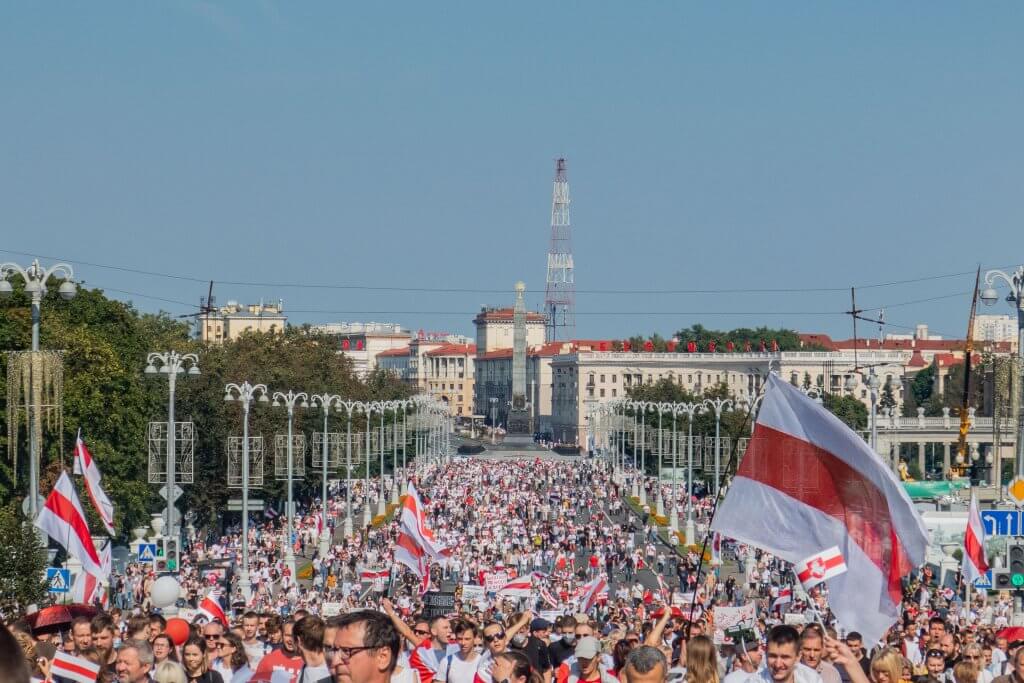One month has passed since the election in Belarus on 9 August, which was followed by mass protests and unprecedented levels of repression and intimidation of Belarusian citizens. As protests continue, Alexander Lukashenko, who has been in power in Belarus for 26 years, seems to stop at nothing to hold on to power.
The regime’s pressure on political activists and bloggers started long before the electoral campaign launch: At least 1340 persons were arbitrarily detained and fined between 6 May and 4 August, Viktor Babariko and Sergei Tikhanovsky – the two main political opponents of “The Cockroach” (Alexander Lukashenko’s popular nickname) – were imprisoned, and Valery Tsepkalo, a third powerful contender, were forced to flee from the country.
The election itself was held without international observers and with a huge number of documented cases of election fraud, which is why a great number of voters were filled with indignation by Lukashenko’s “landslide” victory (80% of the votes) and have taken to the streets to protest, despite the brutal crackdown by riot police and other security units.
In a review of the Human Rights Situation in Belarus for August 2020, the Belarusian Human Rights Center “Viasna” stated that there is an ongoing
“deep human rights crisis in the country, which affects almost every aspect of civil and political rights”.
Tough figures
The ongoing Belarusian protests have been largely peaceful: not a single shop window has been broken (except one broken by security force officers who were chasing protesters on 6 September) and not a single car burned. Despite the election fraud, most protesters seem to do their best to avoid provocations, comply with the law and even make efforts to remove the rubbish after the rallies.
Nevertheless, the monthly outcome is more than sad: thousands of people have been brutally detained and abducted; hundreds have been heavily injured and tortured; 47 are considered political prisoners and at least nine, reported missing or killed.
According to the NGO “Viasna”, since 9 August, more than 8000 protesters, including journalists, minors and bystanders, have been detained across the country. Belarusian detentions would not be so frightening unless numerous proofs of further heavy beating and humiliations in police vans and detention centres.
Experts from the UN have stated that at least 450 persons were ill-treated in a systematic way during and after detention, including sexual abuse and rape cases. More than 200 people were admitted to hospitals with heavy injuries, including a 5-year-old girl in Grodno.

At least 6 individuals are still reported missing and at least 3 persons have died as a result of police action (Alexander Taraikousky in Minsk and Gennady Shutov in Brest) or inaction (bypasser Alexander Vikhor from Homieĺ).
There is no separation of powers in Belarus, which is why the Belarusian prosecutors avoid initiating criminal proceedings against security force staff. Despite hundreds of criminal complaints with evidence of bodily injuries, no criminal cases have been opened against the Interior Ministry and the Ministry of Defense officers.
Meanwhile, more than 80 criminal cases have been initiated against peaceful protesters in charge of “mass riots”.
They include those of political prisoners whose number increased from 24 (as of 9 August) to 47 (as of 8 September).
A society targeted
The evidence of political pressure from Lukashenko’s regime is traceable in all aspects of Belarusian society. Members of the Belarus Coordination Council, the newly formed opposition group, and independent media have been targeted by the security forces but below you will find some examples from health professionals, the Catholic church, educators and university students, public sector and industry workers, that might not have not made it to the headlines.
Medical staff victims
On 11 Aug, the emergency medical assistant Daniil was brutally assaulted and detained when trying to give first aid to a protester in need. In a detention centre, he was marked with yellow paint and beaten with batons for “treating those who come back and carry on fighting”.
The clinic urologist Alexey Belastotski was hospitalised after having been detained at Minsk detention centre, suffering heavy traumas due to beatings in a police van and in the police office. Alexey was detained on 2 September, shortly after offering medical help to protesters in need. On 17 August, he publicly criticised police staff for brutality toward hospitalised protesters.
The anaesthetist Ihar Tabolich was given a 2-day arrest and 25-penalty-unit fine only for having accompanied his fiancee who participated in a women solidarity chain in Minsk on 29 August.
The Catholic Church scandals

On the evening of 26 August, while dispersing protesters, riot police officers blocked the entrance and exit of the Catholic Red Church in Minsk and on 31 August, Tadevuš Kandrusievič, Chairman of the Conference of Catholic Bishops of Belarus, was refused entry from Poland to Belarus by border authorities without any reasons.
Students and educators vs. black balaclavas and administrative pressure
On 1 September, the first day back in schools in Belarus, students at some universities, including the major ones, started to organise and participate in mass protests and demonstrations that police block and disperse.
On 4 September, five students from Minsk State Linguistic University (MSLU) were brutally detained by plain-clothed men in balaclavas at the university hall just for singing ‘Do You Hear the People Sing?’ from the musical Les Misérables together.
The head of MSLU banned unauthorised student actions within the university, while the head of Vitebsk State Vet Academy threatened to expel students who had been detained. This threat was carried out against at least one student, Ekaterina Lubetskaya.
Alena Buglayeva, a school principal, was the head of a local polling station in Brest, where Svetlana Tikhanovskaya won by a landslide. As a result, Ms Buglayeva was forced to leave the school together with two colleagues. On 5 September, more than 100 parents rallied near the school in support for her return yet the local administrator declared that she had left without coercion.
Public sector employees
Some public employees have been forced to participate in pro-Lukashenko rallies. Otherwise, they are threatened to lose their work accommodation, pay, and bonuses or to be fined.
Protesting workers of Belaruskali, one of the largest manufacturers and exporters of potash fertilisers in the world, have been forced to submit written explanations to the management. On 31 August, Anatoli Bakun, the head of the Belaruskali strike committee, was detained. Earlier on, Lukashenko threatened Belaruskali strikers to replace them with labour from Ukraine.
On 6 September, several lifeguards helped some protesters who had jumped into the Svislach river to escape from riot police. The same day, the lifeguards were detained.
What’s next for Belarus?
Since the detention on 6 September of Maria Kalesnikova, the last member of the anti-Lukashenko opposition trio (‘Tikhanovskaya-Tsepkalo-Kalesnikova’) who had remained in Belarus, the protests in Belarus are becoming more decentralised. Yet everyday people continue to take to the streets demanding Lukashenko’s resignation, new fair and free election, the release of all political prisoners and the punishment for crimes against humanity in the country. And everyday there are new and more brutal detentions of protesters.

Facing the outrage from special force units and the judicial administration, Belarusians increasingly feel they cannot rely on the state and have become much more willing to follow the strategic “Plan to Win” that was posted on the main protest Telegram channels on 28 August.
This is why protests are very likely to carry on – not only on the streets – but also economically, through delayed tax, utility bills and other payments and the boycott of pro-government businesses; technologically, through so-called hacker wars against government bodies and security officers; politically by recalling pro-Lukashenko deputies, ignoring official public events; legally by documenting rights violations and crimes against humanity and identifying the special police officers committing the crimes and, finally, internationally by promoting the broadcasting of news from Belarus and lobbying international bodies to introduce sanctions on Lukashenko and his regime.

